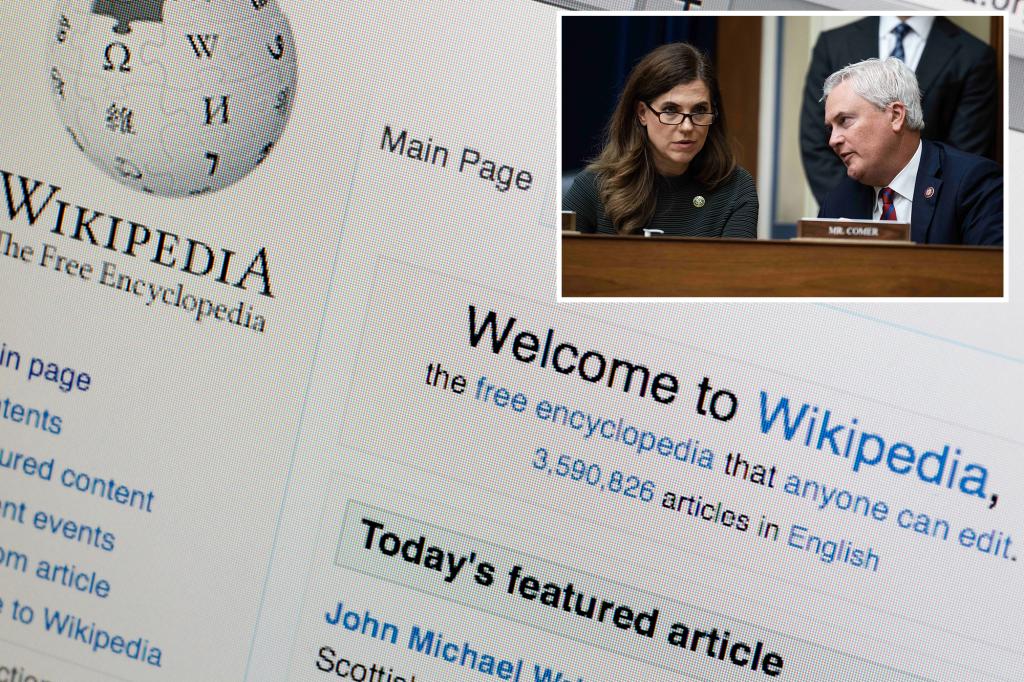Wikipedia Under Scrutiny: Trump Administration Launches Investigation into Alleged Foreign Manipulation
In a move that highlights growing concerns about information integrity in the digital age, the Trump administration has initiated an investigation into Wikipedia over allegations of foreign interference. The probe, launched by Republicans on the House Oversight and Government Reform Committee, aims to examine claims that foreign entities and organizations have been altering Wikipedia articles to manipulate American public opinion. This investigation comes at a time when questions about online information sources and their vulnerability to external influence have become increasingly prominent in national discourse.
The committee’s investigation focuses particularly on Wikipedia’s volunteer editor system, which forms the backbone of the platform’s content creation process. In a letter addressed to the organization, Committee Chair James Comer (R-KY) and Representative Nancy Mace (R-SC) cited studies revealing “efforts to manipulate information on the Wikipedia platform for propaganda aimed at Western audiences.” This concern strikes at the heart of Wikipedia’s operating model, which relies on thousands of unpaid editors worldwide to create, modify, and maintain its vast repository of articles. The probe seeks to understand what safeguards Wikipedia has implemented to “thwart intentional, organized efforts to inject bias into important and sensitive topics,” according to reporting by The Hill.
What makes this investigation notable is its focus on Wikipedia specifically – a platform often regarded as a neutral source of information by millions of users globally. Unlike social media platforms that have faced similar scrutiny in recent years, Wikipedia presents itself as a collaborative knowledge project with built-in systems for verifiability and neutrality. However, these very systems rely on human editors who, despite community oversight, may potentially be influenced by external agendas. The investigation raises important questions about how open platforms can maintain their integrity while remaining accessible to contributors from around the world, particularly when dealing with politically sensitive or contentious topics.
The congressional letter acknowledges the universal challenge faced by online information platforms, noting that “virtually all web-based information platforms must contend with bad actors and their efforts to manipulate.” This recognition suggests the investigation isn’t simply targeting Wikipedia but addressing broader concerns about information warfare in the digital space. With Wikipedia receiving billions of views monthly and often appearing at the top of search results for countless topics, its potential as a vector for subtle influence operations cannot be overlooked. The site’s articles on political figures, international relations, and historical events could be particularly vulnerable to manipulation attempts that shape public perception.
For Wikipedia, this investigation presents both a challenge and an opportunity. On one hand, it places the organization under uncomfortable scrutiny and potentially threatens its reputation for neutrality. On the other hand, it could lead to improved safeguards and transparency measures that ultimately strengthen the platform’s reliability. The Wikimedia Foundation, which operates Wikipedia, has long acknowledged the existence of coordinated editing campaigns and has implemented various measures to detect and counter them. However, the scale and complexity of the platform make comprehensive monitoring difficult, especially when sophisticated actors may be involved.
As this investigation unfolds, it highlights the evolving battleground of information integrity in our digital ecosystem. Traditional concerns about propaganda have transformed in the internet age, where influence operations can be subtle, distributed, and difficult to attribute. The outcome of this probe may have implications not just for Wikipedia but for how we approach the governance of collaborative information platforms more broadly. In an era where public trust in information sources is already fragile, finding the balance between openness and security represents one of the most significant challenges for platforms that aim to democratize knowledge creation. Whether this investigation leads to regulatory changes, internal reforms, or simply greater awareness, it underscores the reality that even our most trusted information sources require vigilance in an age of sophisticated information manipulation.


